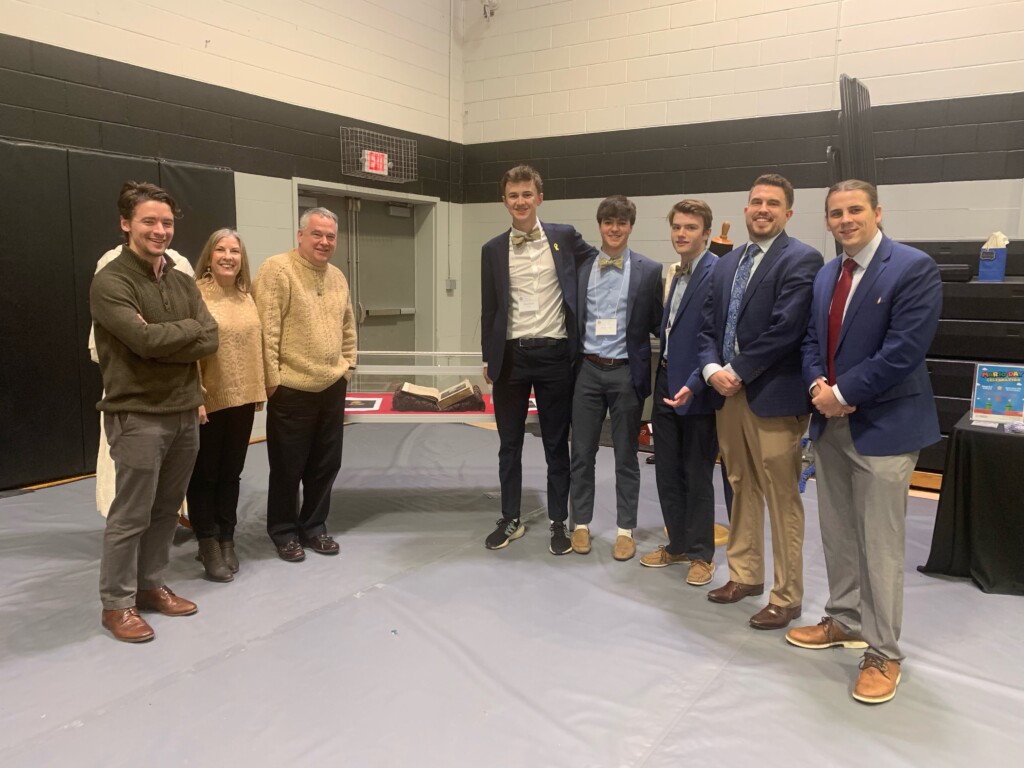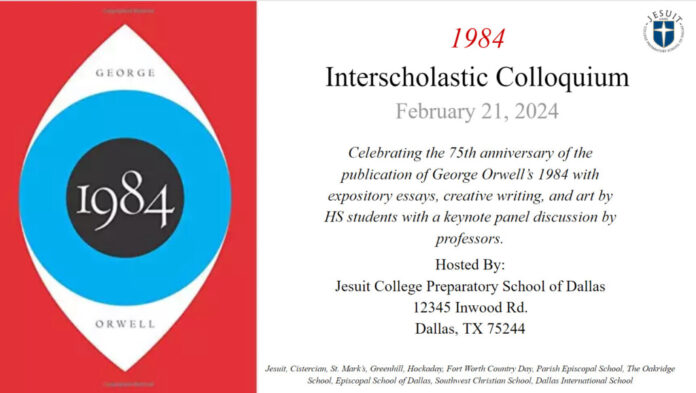Next semester, on the 21st of February, Jesuit’s English Department will be hosting this year’s annual Interscholastic Colloquium.
Now you might ask what is a colloquium, well to put it simply a colloquium is an opportunity to present and defend your interpretation, thesis, and essay in response to a topic and piece of literature.
The focus for this colloquium will be on George Orwell’s 1984, a novel that has been studied by our junior-level English classes. However, participation is not limited to those who have covered the novel in class, and all students are encouraged to present. The Colloquium this year marks the 10th Anniversary of the event and also celebrates the 75th anniversary of Orwell’s novel.

Last year, the Interscholastic Colloquium was hosted at Cistercian. The event was attended by myself and two other juniors, along with multiple members of the English faculty. The colloquium was a great opportunity to present essays we had written in class on Shakespearean plays, and to develop skills for expository essays that have helped us in AP Lit.
A Faculty Insight
But that’s enough from me, here’s what Mr. Hauser, English Faculty Chair, had to say about the plans for the 1984 Colloquium:
Why did Jesuit decide to host the Colloquium?
Jesuit decided to host the colloquium this year because a few of us English colleagues that went to the Shakespeare Colloquium last year with the First Folio had such a positive experience that we thought that this was something fun and something that we can take on. We thought it was really enriching for the boys and for us and we wanted to also have an opportunity to demonstrate the prowess of our own English department in comparison to our other competitor schools academically.
How would you describe a colloquium to someone who has never heard of one before?
It’s a glorified high school essay contest for lack of a better term. The idea is a common text is chosen among schools, and students submit academic papers on the set text. The set text is usually a celebratory text based around a literary anniversary. The goal is that students will show through literary analysis and creative processes how the text is important and symbolic for society today.
What skills can students take away from participating?
One thing the colloquium offers that you don’t get in a normal classroom is the sense of having to give a defense for the points that you are arguing. For instance, a lot of people have to state a thesis when they write an expository essay but very few people have to get up and verbally defend it. To be able to answer questions, volley, and dialogue on an intellectual level with other like-minded people who also know the text well is a great college prep event and skill. Hopefully, a lot of kids will go on to higher education like masters and doctorates where this panel-like, fishbowl atmosphere is a first echo of a master’s or PhD defense where you have to defend your thesis against a panel of people.
What would you say to students who are interested in participating but haven’t studied 1984 in class?
There’s still time, being a host school we can take late entries. The first step would be to read or even listen to the novel over Christmas break and reach out to me for the set prompts. But if you really have a desire or passion to do it, it’s really just a matter of reaching out to the junior teachers who have taught the book. We can read through your argument and help get it colloquium-ready.
Are there any special events or speakers planned for the day?
This is the first time ever for what we’re doing, we’re doing something special for the tenth anniversary edition for the colloquium which started in 2013. Historically, it’s always been a single keynote speaker at the end of the event. But after talking amongst English colleagues in the department, given the sensitivity of the political nature of the book, we thought it’d be really unique to model for the students, what does it look like to have formal, cordial dialogue around a particular topic. This is especially important given the state of American politics and society today, and how rhetorically charged people can get, we thought of the idea of a panel. So we’re going to have a three-person panel, this is the first time the Colloquium has ever had a live panel. Experts in different fields will be giving their own insights about the novel and presenting their ideas, and there will be time for the audience to ask questions to the panel and dialogue with the students directly. This allows the entire community to take part in the discussion.
If you are interested in participating in this year’s colloquium, feel free reach out to Mr. Hauser or your English teacher.
For more details see the Colloquium’s website or my article on last year’s Colloquium.
Stay tuned to the Jesuit Roundup for more academic and school news!






